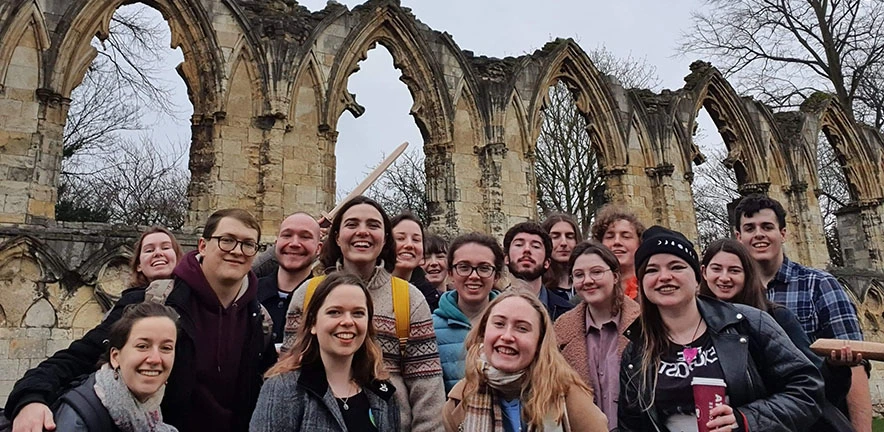
Anglo-saxon, Norse, And Celtic
Overview
The Anglo-Saxon, Norse, and Celtic courses focus on the material culture, history, languages, and literature of the peoples of Britain, Ireland, and the Scandinavian world in the earlier Middle Ages. You will get to explore mediaeval history while learning one or more languages and studying great works of literature in the original languages.
Objectives
- Developing Linguistic Proficiency in Old English, Old Norse, and Celtic Languages
- Comprehensive Understanding of Early Medieval Literature
- Exploring the Cultural and Historical Contexts of Anglo-Saxon, Norse, and Celtic Societies
- Cultivating Interdisciplinary Research and Analytical Skills
- Fostering a Critical Approach to Textual and Archaeological Sources
- Enhance Awareness of Medieval Worldviews, Mythologies, and Religious Beliefs
- Analysing the Material Culture of the Early Medieval Period
Prerequisites
- Basic History Requirement
- Writing and Research Skills
- Fieldwork Experience
Curriculum Outline
- Anglo-Saxon history
- Scandinavian history
- Gaelic history (Scotland, Ireland and the Isle of Man)
- Brittonic history (Wales, Brittany, Cornwall, the Pictish kingdoms and the North Britons)
- Old English
- Old Norse
- Medieval Welsh
- Medieval Irish
- Medieval Latin
- Palaeography (the study of manuscripts and handwriting)
- Divinity
- English
- Modern and Medieval Languages
- Rethinking the Viking Age
- ‘Beowulf’
- Advanced Medieval Irish Language and Literature
- Germanic Philology
- Medieval English literature
- Medieval French literature
- Historical linguistics
- Subject from the Faculty of Divinity
Teaching Method
- Lectures
- Classes
- Seminars
Modules
- Introduction to Old English
- Introduction to Old Norse
- Celtic Languages
- Old Irish
- Advanced Old Norse
- Reading Medieval Texts
- Medieval Anglo-Saxon Literature
- The Old Norse Sagas
- The Poetic Edda and Prose Edda
- Celtic Mythology and Literature
- Viking Poetry
- Medieval Welsh Literature
- The Anglo-Saxon World
- The Viking Age
- Medieval Ireland and Celtic Britain
- Early Medieval Kingship and Warfare
- Norse Society and Settlement
- The Archaeology of the Viking Age
- Anglo-Saxon Archaeology
- Celtic Archaeology
- Archaeology of Early Medieval Christianity
- Religion and Mythology in the Early Medieval World
- Medieval Cosmology and Worldview
- Medieval Gender and Society
- Law, Society, and Kingship in Early Medieval Europe
Assessment Methods
- Written exams
- Coursework
- Dissertation
Course Duration
It typically takes three to four years if you study full-time. Some universities offer part-time degrees, which can take around five to six years.
Facilities
- Libraries and Archives
- Language Laboratories
- Research and Seminar Rooms
- Archaeological and Material Culture Collections
- Viking and Medieval Studies Centres
Career Pathways
- Research and teaching in schools and universities
- Work in museums and libraries
- Journalism
- Publishing
- Banking
- Law
- Civil Service
- Industry and business
Fees and Fundings
The tuition fees may vary depending on the university, country, and whether you are an international student or a local student. For the UK, the fee range for an international student is between £25,000 and £30,000 a year.
Entry Requirements
- A high school diploma or equivalent
- English Language Proficiency
- Personal Statement
Field Work and Internships
- Archaeological Fieldwork
- Museum Internships
- Historical and Literary Research Internships
- Public Engagement and Outreach
- Fieldwork and Internships at Heritage Sites
Certifications
- University Degree Certifications
- Language Proficiency Certifications
- Archaeological Certifications
- Digital Humanities Certifications
- Heritage and Museum Studies Certifications
- Public History Certifications
Intakes
The intake can vary by country and institution. In the UK, the primary intake is September, and the secondary intake is January, whereas in the USA, it is August and January consecutively.
Student Testimony
I completed the ASNC MPhil in 2021–22 and found the course to be incredibly enriching. The department, as its name suggests, is one-of-a-kind (bar the American Society of Nuclear Cardiology, which also dons the ASNC-acronym). To be surrounded by professors and peers whose research interests relate, be it closely or tangentially, to your own is a bit of a dream, especially for anyone interested in the deceptively vast remit of the Insular early-medieval world. [Emma Claire Geitner from University of Cambridge]
Frequently asked questions
No, Norse and Anglo-Saxon are not the same, but they are related in some ways. Both are part of the Germanic language family, but they represent different groups of people and cultures.
